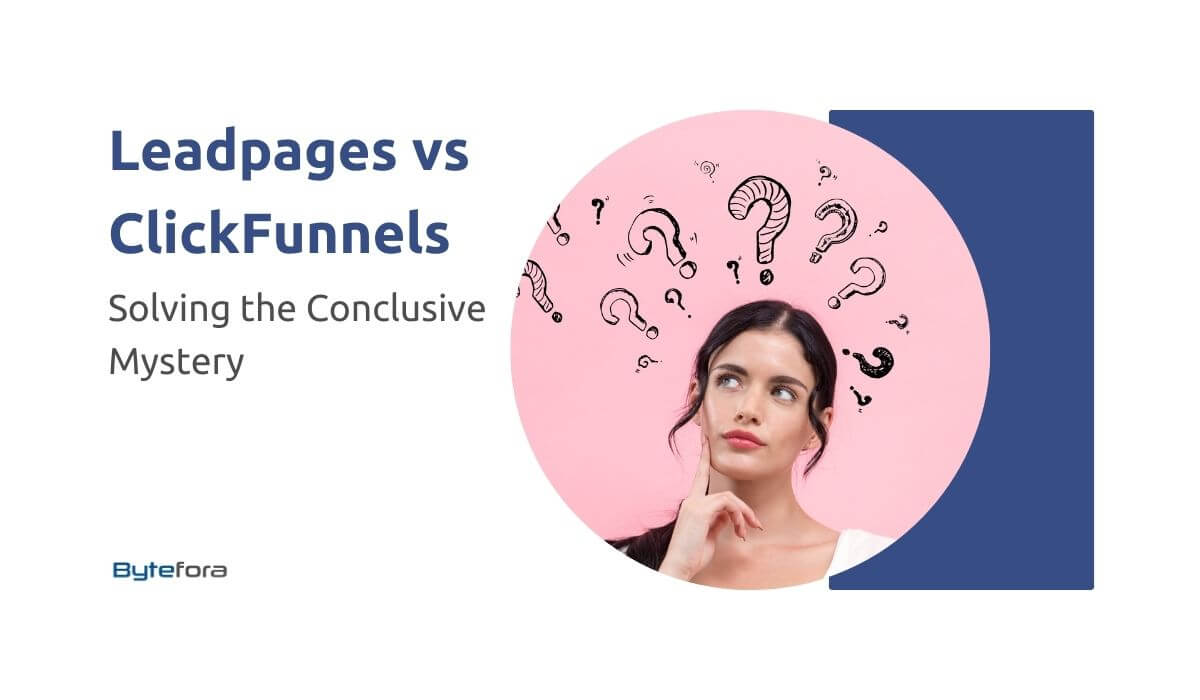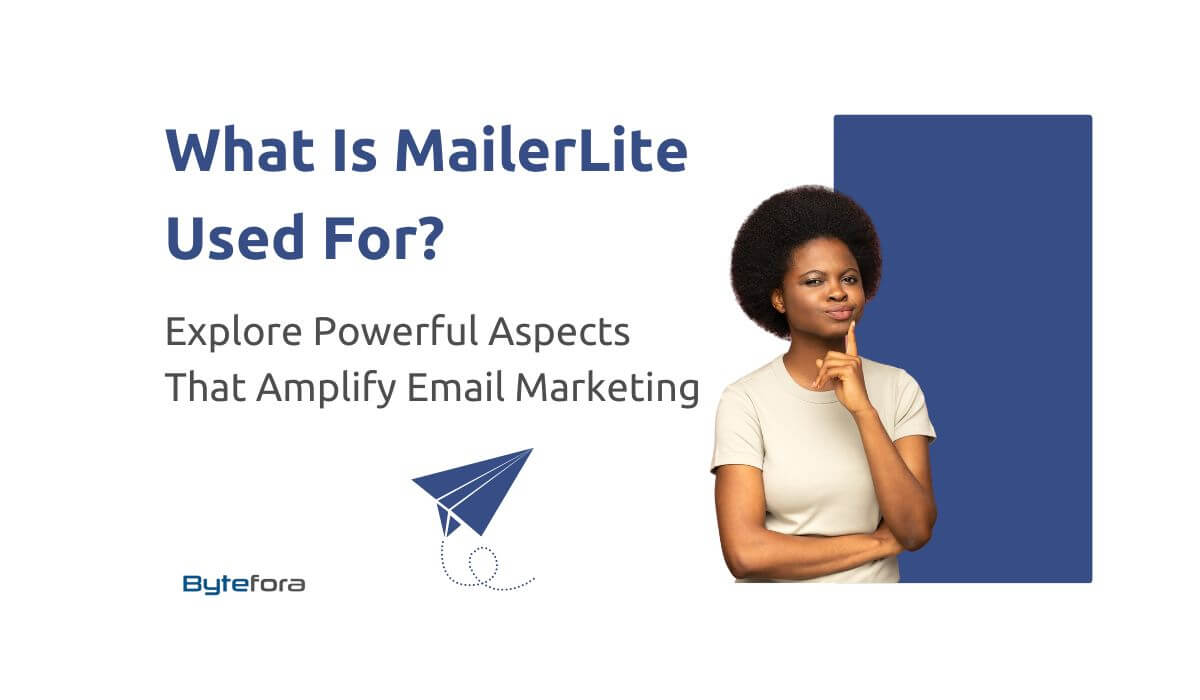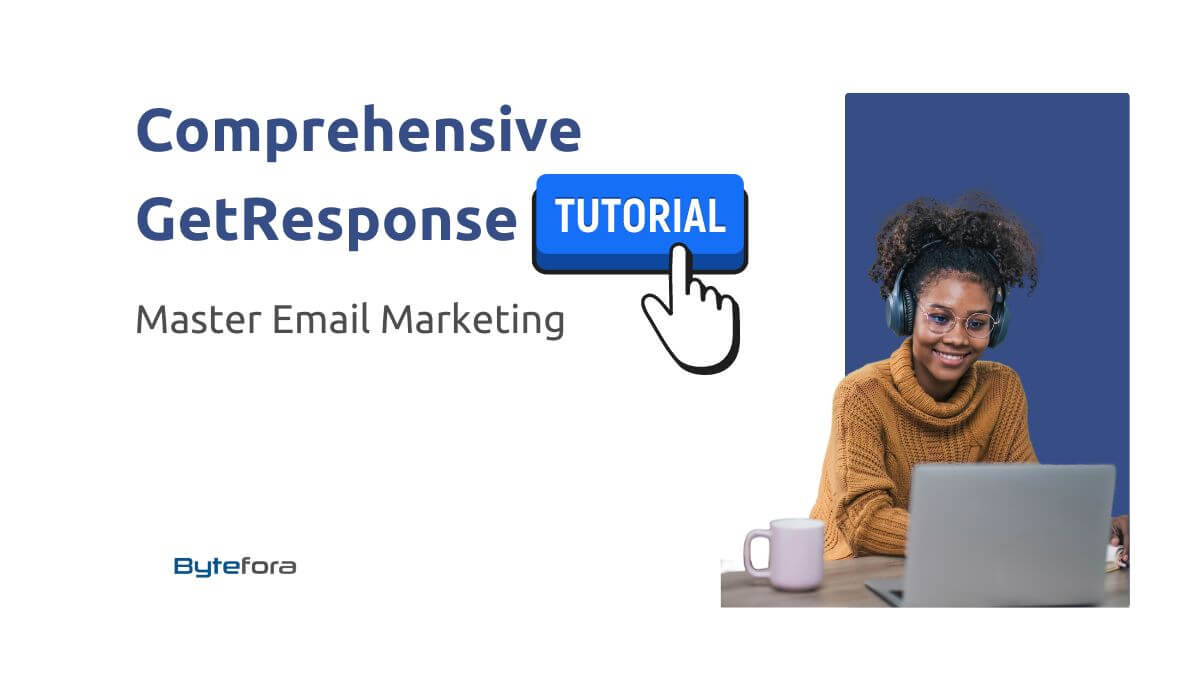Crafting a compelling online presence is a non-negotiable facet for businesses aiming to thrive. With numerous tools and platforms at our disposal, the challenge lies in selecting the right ones that align with our marketing goals. One such crucial decision revolves around choosing between Leadpages and ClickFunnels – two prominent players in online marketing.
As businesses strive to maximize their online impact, the quest for practical marketing tools has become more pronounced. In this article, we embark on a journey to unravel the intricacies of Leadpages and ClickFunnels, shedding light on their features, functionalities, and the unique value they bring.
Our mission is clear: empower businesses, both seasoned players and newcomers, with the knowledge to make an informed decision. Whether you’re seeking user-friendly landing page creation, robust sales funnel management, or seamless integration with your existing toolkit, understanding the nuances of Leadpages vs ClickFunnels is paramount.
Before we delve into the specifics, let’s briefly underscore the fundamental role of these platforms in the broader context of online marketing and set the stage for a detailed exploration. In the following sections, we’ll dissect the core features, compare user experiences, evaluate pricing models, and present real-world case studies to equip you with the insights needed to navigate the marketing maze and make the right choice for your business.
Table of Contents
Understanding the Basics
Success hinges on the ability to captivate and convert visitors into customers. Central to this endeavour are the foundational elements of landing pages – digital gateways designed to entice, inform, and guide users toward a specific action.
Overview of Landing Pages
Landing pages serve as the virtual storefronts of the digital world, offering visitors a focused and tailored experience. Product or facilitate sign-ups, a well-crafted landing page acts as a compelling entry point into a brand’s offerings.
Critical components of an effective landing page include
- A concise headline.
- Compelling visuals.
- Persuasive copy.
- A clear call-to-action (CTA).
- Trust-building elements such as testimonials or trust badges.
- A compelling journey that nudges visitors towards a conversion.
Introduction to Leadpages
Leadpages, a stalwart in the realm of online marketing tools, specializes in simplifying the creation and optimization of landing pages. Its user-friendly interface empowers marketers, entrepreneurs, and business owners to design professional-looking pages without extensive coding or design skills.
Features and Functionalities
Leadpages boasts many features, including a drag-and-drop page builder, customizable templates, A/B testing capabilities, and integration with various third-party tools. It caters to multiple industries, from e-commerce and education to consulting and beyond, making it a versatile solution for businesses of all sizes.
Pros and Cons
Among its merits, Leadpages stands out for its ease of use, rapid page creation, and budget-friendly pricing. However, some users may need more customization options, depending on the depth of personalization they seek.
Introduction to ClickFunnels
Enter ClickFunnels – a heavyweight contender in the online marketing arena, renowned for its specialized approach to sales funnel creation. Unlike traditional landing pages, ClickFunnels extends its functionality to guide users through a step-by-step journey, often culminating in a sale or desired conversion.
Features and Functionalities
ClickFunnels provides a comprehensive suite of tools encompassing landing page creation, sales funnel management, and even membership site building. Its emphasis on funnel-centric design sets it apart, allowing users to create entire sequences of interconnected pages easily.
Pros and Cons
ClickFunnels’ strength lies in its robust sales funnel and intricate sales processes. However, the learning curve may be steeper for newcomers, and some users may find it a more substantial investment than other alternatives.
FeatureThe showdown between Leadpages and ClickFunnels provides a granular comparison of their capabilities to aid your decision-making process.
Feature Showdown
Now that we’ve grasped the basics of landing pages and introduced Leadpages and ClickFunnels, let’s dive into the heart of the feature showdown. Understanding the specific capabilities of each platform
Page Building Capabilities
Leadpages and ClickFunnels boast user-friendly interfaces, but the devil lies in the details. Leadpages’ drag-and-drop builder is simple, allowing users to swiftly create visually appealing landing pages. ClickFunnels, on the other hand, takes a holistic approach by facilitating the creation of entire sales funnels with interconnected pages. The choice here hinges on the depth of your marketing strategy – a single impactful landing page or a comprehensive funnel sequence.
Regarding customization, Leadpages provides a range of templates but may be perceived as restrictive for those seeking highly tailored designs. ClickFunnels, known for its flexibility, empowers users to customize every aspect of their funnel, albeit at the cost of a steeper learning curve.
Regarding mobile responsiveness, both platforms prioritize ensuring a seamless experience across devices. Leadpages streamlines this process with automatic mobile optimization, while ClickFunnels offers extensive control over the mobile layout, granting users the ability to fine-tune their mobile user experience.
Sales Funnel Creation
Here, ClickFunnels takes center stage. Its raison d’être is creating and managing sales funnels – a series of steps guiding potential customers towards a conversion. While Leadpages has integrated funnel capabilities, ClickFunnels’ dedicated focus on this aspect provides a more intricate and streamlined process.
Leadpages users can create simple funnel sequences, but ClickFunnels goes above and beyond, allowing for the construction of complex funnels with various upsells, downsells, and order bumps. This distinction makes ClickFunnels an attractive proposition for businesses with sophisticated sales strategies.
Integration and Compatibility
A cohesive marketing strategy. Both Leadpages and ClickFunnels understand this necessity.
Leadpages supports third-party integrations, ensuring compatibility with popular marketing tools, email platforms, and CRM systems. ClickFunnels, in its pursuit of offering an all-encompassing solution, also provides robust integration options—external tools, enhancing the overall functionality of its marketing stack.
Analytics and Tracking
Guiding strategic decisions. Leadpages equips users with analytics tools to monitor page performance, track conversions, and gain insights into visitor behavior. ClickFunnels, being a comprehensive funnel management solution, provides detailed analytics for each step of the funnel, enabling a granular understanding of the customer journey.
Both platforms contribute significantly to data-driven decision-making, but the depth of analytics required may influence your choice between Leadpages and ClickFunnels.
As we navigate these features, it becomes evident that the choice between Leadpages and ClickFunnels hinges on your marketing strategy’s specific needs and objectives. In the subsequent sections, we’ll explore user experience, learning curves, and pricing models to understand your decision-making process better.
Pricing Models
In the labyrinth of choosing the right marketing tool, understanding the financial aspect is paramount. Leadpages and ClickFunnels offer various pricing plans tailored to different business needs. Let’s dissect the pricing models to uncover the value they bring and help you make a well-informed decision.
Leadpages Pricing Plans
Leadpages provides a tiered pricing structure designed to cater to diverse users.
Basic Plan: At the entry level, the Basic plan offers essential features, making it suitable for small businesses or those new to online marketing. It’s a cost-effective option, but some advanced functionalities may be restricted.
Standard Plan: Stepping up, the Standard plan introduces additional features, making it an attractive proposition for growing businesses with expanding marketing needs. It offers increased customization options and A/B testing capabilities.
Pro Plan: Tailored for businesses seeking advanced marketing tools, the Pro Plan unlocks many features, including lead generation tools, advanced integrations, and priority customer support.
Advanced Plan: Geared toward larger enterprises, the Advanced Plan offers top-tier features, enhanced support, and strategic coaching sessions. It’s a comprehensive solution for businesses with intricate marketing requirements.
ClickFunnels Pricing Plans
ClickFunnels, too, follows a tiered pricing model, aligning with the diverse needs of businesses engaged in multifaceted marketing strategies.
Basic Plan: The entry-level Basic plan provides users with the core features necessary for creating sales funnels. While it’s an affordable option, some advanced functionalities may be limited.
Platinum Plan: Positioned as the middle ground, the Platinum plan offers additional features, including the infamous Follow-Up Funnels and access to the FunnelFlix suite. It’s a suitable choice for businesses scaling up their marketing efforts.
Collective Plan: Aimed at established enterprises, the Collective Plan provides an all-encompassing suite of tools, advanced training, and priority support. It caters to businesses with extensive marketing needs and a focus on maximizing conversion rates.
Considerations for Decision-Making
When choosing between Leadpages and ClickFunnels based on pricing, consider the size of your business, your current marketing needs, and the growth trajectory you envision. While Leadpages may be a more budget-friendly option for smaller enterprises or those focusing on standalone landing pages, ClickFunnels might be the preferred choice for businesses prioritizing intricate sales funnels.
Remember to account for potential hidden costs or limitations within each plan. Additionally, both platforms may offer periodic promotions or discounts, so keeping an eye out for cost-saving opportunities is worthwhile.
As we move forward, we’ll explore real-world case studies, providing tangible examples of businesses that have thrived using Leadpages and ClickFunnels. These case studies will offer practical insights into how each platform performs in different scenarios, aiding you in making a decision aligned with your business objectives.
Real-world Case Studies
Let’s delve into real-world case studies to truly understand the efficacy of marketing tools like Leadpages and ClickFunnels. These examples provide tangible insights into how businesses have leveraged each platform to achieve their marketing objectives.
Success Stories with Leadpages
Case Study: E-Commerce Expansion
Challenge: An emerging e-commerce brand sought to expand its online presence and capture a wider audience.
Solution with Leadpages: Leveraging Leadpages’ user-friendly interface, the brand quickly created visually appealing product pages and promotional landing pages. A/B testing enabled them to optimize for conversions.
Results: The brand witnessed a significant uptick in website traffic and a notable increase in conversion rates, leading to a substantial boost in online sales.
Case Study: Event Marketing
Challenge: An event management company aimed to enhance its digital marketing efforts to attract more attendees for upcoming events.
Solution with Leadpages: Utilizing Leadpages’ event registration templates and integration capabilities, the company created dedicated landing pages for each event. The platform’s analytics tools helped track registration numbers and attendee engagement.
Event registrations are attributed to the streamlined and visually appealing registration process facilitated by Leadpages.
Success Stories with ClickFunnels
Case Study: High-ticket Coaching Programs
Challenge: A coaching business specializing in high-ticket programs needed a platform to manage its sales funnel efficiently and nurture leads through a multi-step process.
Solution with ClickFunnels: ClickFunnels’ robust sales funnel creation tools allowed the business to design a comprehensive funnel with upsells, downsells, and personalized follow-up sequences. The platform’s membership site features facilitated seamless onboarding for enrolled clients.
Results: The coaching business not only streamlined its sales process but also witnessed increased client retention and satisfaction, attributing it to the personalized and automated customer journey enabled by ClickFunnels.
Case Study: Product Launch Campaign
Challenge: A tech startup gearing up for a product launch needed an efficient way to generate buzz, capture leads, and drive pre-orders.
Solution with ClickFunnels: Leveraging ClickFunnels’ funnel-centric design, the startup created a sequence of pages guiding potential customers from awareness to purchase. The platform’s integration capabilities allowed seamless connection with email marketing tools for ongoing communication.
Results: The product launch exceeded expectations, with ClickFunnels’ data analytics showcasing a high conversion rate during the pre-order phase. The startup built a pre-launch community, translating into a successful product release.
These case studies underscore the versatility of Leadpages and ClickFunnels across diverse industries and marketing objectives. As we wrap up the comparison, we’ll explore user experience and learning curves and offer insights into deciding between these powerful marketing tools.
Making the Decision
Having navigated through the features, pricing models, and real-world case studies of Leadpages and ClickFunnels, the time has come to distil this information into a decisive choice. Making the right decision between these two powerful marketing tools hinges on aligning their capabilities with your business needs and marketing goals.
Assessing Business Needs
Business requirements. If your primary focus is creating visually appealing and effective standalone landing pages, Leadpages might be the more streamlined choice. Its user-friendly interface and budget-friendly pricing plans make it particularly appealing for businesses with more straightforward marketing strategies or those in the early stages of growth.
On the other hand, if your marketing strategy involves intricate sales funnels with multiple steps, upsells, and downsells, ClickFunnels emerges as a formidable contender. Businesses seeking a comprehensive solution to guide potential customers through a meticulously designed journey may find ClickFunnels the ideal match.
Matching Features to Marketing Goals
Consider each platform’s specific features and how they align with your marketing objectives. If your priorities are rapid page creation, ease of use, and A/B testing, Leadpages may be the more fitting choice. Its focus on simplicity and efficiency makes it an excellent tool for businesses aiming to create impactful landing pages without delving into complex funnel structures.
Conversely, if you envision a multi-step customer journey with personalized upselling and advanced analytics, ClickFunnels could be the solution that caters to your strategic needs. Its funnel creation and management emphasis positions it as a go-to platform for businesses with a more intricate sales process.
Considering Budget Constraints
While both Leadpages and ClickFunnels offer tiered pricing plans, the suitability of each depends on the financial resources available to your business. Leadpages may be a more budget-friendly option for those prioritizing cost-effectiveness, especially for smaller enterprises or companies with less complex marketing strategies.
ClickFunnels, while potentially requiring a higher investment, is a valuable asset for businesses seeking an all-encompassing solution with robust sales funnel capabilities.
Remember that your decision is not set in stone as you weigh these factors. Both Leadpages and ClickFunnels have proven to be practical tools for many businesses. It’s about finding the one that aligns most closely with your current needs and growth trajectory.
In the final section, we’ll conclude our exploration, summarizing key insights and offering a definitive guide to selecting the right platform based on your unique circumstances. The conclusion will serve as a compass, ensuring your journey through the marketing maze concludes with a confident stride toward success.
Conclusion: Navigating the Marketing Landscape – Choosing Between Leadpages and ClickFunnels
The choice between Leadpages and ClickFunnels is a pivotal thread determining the success of your digital endeavors. Each platform offers unique strengths, catering to distinct facets of the marketing spectrum. As we conclude this exploration, let’s distil the key insights to guide you confidently toward the
The foundation of your decision lies in a deep understanding of your business’s marketing DNA. If you focus on creating visually stunning, high-converting standalone landing pages, Leadpages emerges as an efficient and user-friendly ally. Its simplicity, coupled with budget-friendly pricing plans, positions it as an excellent choice for businesses at various stages of growth.
On the contrary, if your strategy involves weaving intricate sales funnels and guiding potential customers through upsells, downsells, and personalized interactions, ClickFunnels steps into the spotlight. Its robust sales funnel creation tools make it a potent force for businesses aiming to orchestrate a comprehensive and strategic customer experience.
Matching Features to Goals
The features offered by each platform should be viewed through the lens of your marketing goals. Leadpages excels in rapid page creation, ease of use, and A/B testing. If these align with your immediate priorities, it may be the pragmatic choice for your business. ClickFunnels, emphasizing funnel-centric design, is the go-to solution for those seeking an advanced and comprehensive toolset to manage multi-step customer journeys.
Considering the Budget Landscape
Leadpages caters to businesses with a more modest budget, offering cost-effective plans for those seeking a streamlined approach to landing page creation. ClickFunnels, while potentially requiring a higher investment, positions itself as a valuable asset for businesses with intricate sales processes and a commitment to maximizing conversions.
Flexibility in Decision-Making
The decision-making process is not a rigid journey but rather a flexible exploration. Your choice today may evolve as your business grows and its marketing needs transform. Both Leadpages and ClickFunnels have proven track records of success across diverse industries. The key is to match their capabilities with your unique circumstances and aspirations.
The decision between Leadpages and ClickFunnels is not a one-size-fits-all scenario. It’s about aligning the strengths of each platform with your business’s distinct rhythm and trajectory. As you navigate the marketing landscape, may your choice be informed and confident and propel your business toward new heights of digital success.
FAQ Section
Is Leadpages suitable for beginners with limited technical skills?
Absolutely. Leadpages is renowned for its user-friendly interface, making it an ideal choice for beginners. The drag-and-drop page builder requires minimal technical skills, enabling users to create professional-looking landing pages easily.
Can I integrate Leadpages with other marketing tools and platforms?
Yes, Leadpages supports various third-party integrations, ensuring seamless compatibility with popular marketing tools, email marketing platforms, and customer relationship management (CRM) systems. This facilitates a cohesive marketing strategy by connecting Leadpages with your existing toolkit.
How steep is the learning curve for ClickFunnels?
ClickFunnels has a steeper learning curve than other platforms due to its comprehensive feature set. However, the platform provides extensive training resources, tutorials, and support to help users navigate the intricacies of funnel creation and management.
Can ClickFunnels be used for more than just creating sales funnels?
Absolutely. It can be utilized for various purposes, including lead generation, product launches, and even creating membership sites. Its versatility makes it a powerful tool for businesses with diverse marketing needs.
Does ClickFunnels offer A/B testing for optimization?
Yes, ClickFunnels provides A/B testing functionality, allowing users to experiment with different funnel elements to optimize conversions. This feature empowers businesses to refine their strategies.



